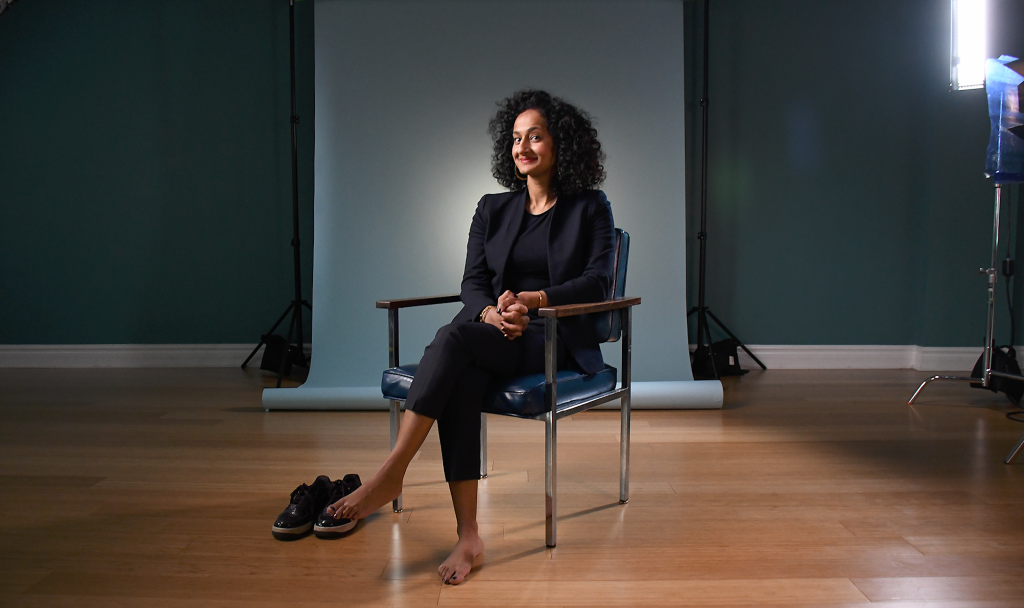Dr. Megha Ramaswamy (PhD, MPH) disseminates insights from her public health research via her (S)HE video series, which stands for Sexual Health Empowerment, and shares stories from women with experiences of incarceration.

“The rapport between us and the participants is really driven by this idea of love and respect, that we show generosity of spirit, and that we listen and pay attention. If you infuse the ethic of love into your work, the work is not only more meaningful, it’s more impactful.”
-Megha Ramaswamy (PhD, MPH)
In her docu-shorts series, Dr. Megha Ramaswamy (PhD, MPH), professor and chair of the Department of Health Systems and Population Health (HSPop), disseminates insights from her public health research. Her (S)HE video series, which stands for Sexual Health Empowerment, shares stories from women with experiences of incarceration. With vulnerability and candor, they discuss substance use, troubles upon leaving prison, mothering, and more. The shorts showcase the women’s resilience, said Ramaswamy.
The (S)HE series is based on a program that Ramaswamy ran for over 15 years at the University of Kansas School of Medicine focusing on cervical cancer prevention, reproductive goal planning, breast cancer prevention, and STI prevention. (S)HE was also implemented in Oakland and Birmingham, and used a harm reduction approach to work with sex workers and people who use drugs.
Expanding reach via YouTube
“I spend, like many academics, a lot of time writing peer reviewed literature, months and months with vetting by peer reviewers, and rejection from, on average, three journals, and at the end of the day, six people read my article. From an impact perspective, it’s frustrating,” reflected Ramaswamy.
“What’s the point if no one understands the health disparities that people who are involved in the criminal legal system face? What’s the point if the federal government has invested a couple million dollars in an intervention that you designed and it works [but] nobody else knows? Putting something in a format in which people can more easily access. . . that means that we are able to more effectively disseminate information.”
With high production values courtesy of a professional cinematographer, her docu-shorts have been able to reach hundreds of people. Megha even taught a course for the MPH program about public health documentary filmmaking, and one of the students’ films was selected to screen in a public health-themed film festival.
The S(HE) series has impacted not only students and audiences, but also participants, who have eagerly shared the videos within their social networks. It was important to make these women feel uplifted and affirmed while on-camera, including through professional hair and makeup sessions, said Ramaswamy.
Building lasting relationships
“Love is a part of our ethic as a team, and it felt like an act of love in the context of research. There’s no reason that there can’t be love in the context of the work we do,” said Ramaswamy. “The idea that we’re trying to elevate a shared humanity to affect policy change always really resonates with people. The mothering video, to me, there’s no better example of humanity–we’re people who love, we’re people who care for children.”
Ramaswamy regularly follows up with participants, including at the ten-year mark, to gauge their progress and hear life updates. Often, participants will reach out to researchers to share that they’ve been released from prison.
Ramasamy has continued to tweak (S)HE, creating a web-based version and launching a new study integrating sexual health, reproductive health, and cancer prevention. That version of (S)HE, she said, has boosted cervical health literacy, breast cancer literacy, and STD literacy. The experience of following research subjects for many years has inspired Ramaswamy to delve into a new topic: aging in prison.
“We had a period from the mid-1970s, when Nixon declared the war on drugs, until the 2000s, where we had just a massive expansion of the criminal legal system, a 700% increase in the number of women who were incarcerated in the last 40 years,” Ramaswamy explains. “As a result, people are getting older and they’re getting sicker, and cancer is going to be a number one cause of mortality. It’s a graying population.”
“On a personal level, when I started this work in Kansas City, I was the same age as the average woman who was incarcerated . . . and so I’ve kind of grown up alongside the women we work with,” she continued. “The women we work with, they’re getting older, and they’re starting to ask questions about what’s happening to their bodies, their brains, and their hormones, just like the rest of us.”
Changing hearts and minds
Five months into her position as HSPoP Chair, Ramaswamy holds onto her personal North Star: the impact that public health makes on real people’s daily lives.
“At the end of some of the shorts, you’ll hear this line, that this is about changing hearts and minds. We see the humanity in the work we do, and we want other people to see the humanity in the work we do, we want our work to affect policy change,” she said.